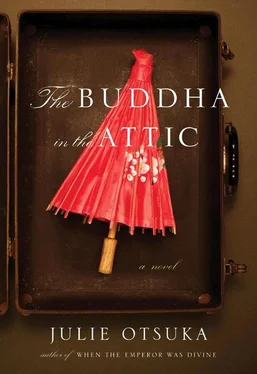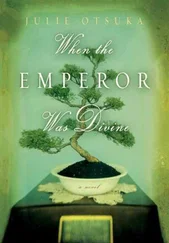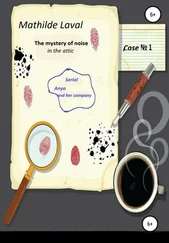BY DAY we worked in their orchards and fields but every night, while we slept, we returned home. Sometimes we dreamed we were back in the village, rolling a metal hoop down the Street of Rich Merchants with our favorite forked wooden stick. Other times we were playing hide-and-seek in the reeds down by the river. And every once in a while we’d see something float by. A red silk ribbon we’d lost years before. A speckled blue egg. Our mother’s wooden pillow. A turtle that had wandered away from us when we were four. Sometimes we were standing in front of the mirror with our older sister, Ai, whose name meant either “love” or “grief,” depending on how you wrote it, and she was braiding our hair. “Stand still!” she said. And everything was as it should be. But when we woke up we found ourselves lying beside a strange man in a strange land in a hot crowded shed that was filled with the grunts and sighs of others. Sometimes that man reached out for us in his sleep with his thick, gnarled hands and we tried not to pull away. In ten years he will be an old man , we told ourselves. Sometimes he opened his eyes in the early dawn light and saw that we were sad, and he promised us that things would get better. And even though we had said to him only hours before, “I detest you,” as he climbed on top of us once more in the darkness, we let ourselves be comforted, for he was all that we had. Sometimes he looked right through us without seeing us at all, and that was always the worst. Does anyone even know I am here?
ALL WEEK LONG they made us sweat for them in the fields but on Sundays, they let us rest. And while our husbands wandered into town and played fan-tan at the local Chinese gambling hall, where the house always won, we sat down beneath the trees with our inkstones and brushes and on long, thin sheets of rice paper we wrote home to our mothers, whom we had promised never to leave. We are in America now, picking weeds for the big man they call Boss. There are no mulberry trees here, no bamboo groves, no statues of Jizo by the side of the road. The hills are brown and dry and the rain rarely falls. The mountains are far away. We live by the light of oil lamps and once a week, on Sundays, we wash our clothes on wet stones in the stream. My husband is not the man in the photograph. My husband is the man in the photograph but aged by many years. My husband’s handsome best friend is the man in the photograph. My husband is a drunkard. My husband is the manager of the Yamato Club and his entire torso is covered with tattoos. My husband is shorter than he claimed to be in his letters, but then again, so am I. My husband was awarded the Sixth Class Order of the Golden Kite during the Russo-Japanese War and now walks with a pronounced limp. My husband was smuggled into the country across the Mexican border. My husband is a stowaway who jumped ship in San Francisco the day before the great earthquake of 1906 and every night he dreams he must get to the ferry. My husband adores me. My husband will not leave me alone. My husband is a good man who works extra hard whenever I cannot keep up the pace so the boss does not send me home .
SECRETLY, we hoped to be rescued from them. Perhaps we had fallen in love with a man on the boat who came from the same island as we did, and remembered the same mountains and streams, and we could not get him out of our mind. Every day he had stood beside us on the deck and told us how pretty we were, how clever, how special . He’d never met anyone like us in his life, he’d said. He’d said, “Wait for me. I will send for you as soon as I can.” Perhaps he was a labor contractor in Cortez, or the president of an import-export company in downtown San Jose, and every day as we dug down into the black, sun-baked earth with our hands we prayed that a letter from him would arrive. And every day there was nothing. Sometimes, late at night, as we were getting ready for bed, we suddenly burst into tears and our husband would look at us with concern. “Was it something I said?” he would ask, and we would just shake our heads no. But when the envelope from the man on the boat finally did arrive one day in the mail —I have sent money to your husband and will be waiting for you at the Taisho Hotel —we had to tell our husband everything. And even though he struck us many times with his belt and called us many well-deserved names, in the end he let us go. Because the money he received from the man on the boat was several times the amount he had spent to bring us over from Japan. “At least now maybe one of us will be happy,” he said to us. He said, “Nothing lasts for long.” He said, “The first time I looked into your eyes I should have known they were the eyes of a whore.”
SOMETIMES the boss would approach us from behind while we were bending over his fields and whisper a few words into our ears. And even though we had no idea what he was saying we knew exactly what he meant. “Me no speak English,” we’d reply. Or, “So sorry, Boss, but no.” Sometimes we were approached by a well-dressed fellow countryman who appeared out of nowhere and offered to take us back with him to the big city. If you come work for me I can pay you ten times what you earn in the fields . Sometimes one of our husband’s unmarried worker friends approached us the moment our husband stepped away and tried to slip us a five-dollar bill. “Just let me put it in once,” he’d say to us. “I promise you I won’t even move it.” And every now and then we’d give in and say yes. “Meet me tomorrow night behind the lettuce shed at nine,” we’d tell him. Or, “For five dollars more I’ll do it.” Perhaps we were unhappy with our husband, who went out to play cards and drink every night and did not come home until late. Or perhaps we needed to send money to our family back home because their rice fields had once again been ruined by floods. We have lost everything and are living on nothing but tree bark and boiled yams . Even those of us who were not pretty were often offered gifts on the sly: a tortoiseshell hairpin, a bottle of perfume, a copy of Modern Screen magazine that had been stolen from the counter of a dime store in town. But if we accepted that gift without giving anything back in return we knew there would be a price to pay. He sliced off the tip of her finger with his pruning knife . And so we learned to think twice before saying yes and looking into another man’s eyes, because in America you got nothing for free.
SOME OF US worked as cooks in their labor camps, and some of us as dishwashers, and ruined our delicate hands. Others of us were brought out to their remote interior valleys to work as sharecroppers on their land. Perhaps our husband had rented twenty acres from a man named Caldwell, who owned thousands of acres in the heart of the southern San Joaquin Valley, and every year we paid Mr. Caldwell sixty percent of our yield. We lived in a dirt-floored shack beneath a willow tree in the middle of a wide, open field and slept on a mattress stuffed with straw. We relieved ourselves outside, in a hole in the ground. We drew our water up from a well. We spent our days planting and picking tomatoes from dawn until dusk and spoke to no one but our husband for weeks at a time. We had a cat to keep us company, and chase away the rats, and at night if we stood in the doorway and looked out toward the west we could see a faint, flickering light in the distance. That, our husband had told us, was where people were. And we knew we never should have left home. But no matter how loudly we called out for our mother we knew she could not hear us, so we tried to make the best of what we had. We cut out pictures of cakes from magazines and hung them on the walls. We sewed curtains out of bleached rice sacks. We made Buddhist altars out of overturned tomato crates that we covered with cloth, and every morning we left out a cup of hot tea for our ancestors. And at the end of the harvest season we walked ten miles into town and bought ourselves a small gift: a bottle of Coke, a new apron, a tube of lipstick, which we might one day have occasion to wear. Perhaps I shall be invited to a concert . Some years our crops were good and the prices were high and we made more money than we’d ever dreamed of. Six hundred an acre . Other years we lost everything to insects or mildew or a month of heavy rains, or the price of tomatoes fell so low that we had no choice but to auction off all our tools to pay off our debts, and we wondered why we were there. “I was a fool to follow you out into the country,” we said to our husband. Or, “You are wasting my youth.” But when he asked us if we would rather be working as a maid in the city, smiling and bowing and saying nothing but “Yes, ma’am, yes, ma’am,” all day long, we had to admit that the answer was no.
Читать дальше












